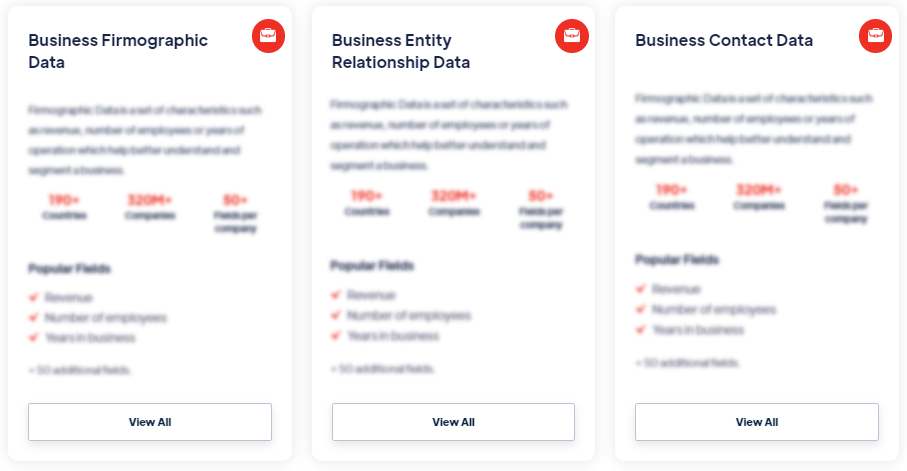Best
Electric Vehicle (EV) Data
Products
Electric Vehicle Data refers to the collection of information related to the usage, performance, and characteristics of electric vehicles. It includes various data points that capture the driving patterns, charging behavior, battery performance, and other key parameters of electric vehicles. Read more
Our Data Integrations


Request Data Sample for
Electric Vehicle (EV) Data

Browse the Data Marketplace

Frequently Asked Questions
1. What is Electric Vehicle (EV) Data?
Electric Vehicle Data refers to the collection of information
related to the usage, performance, and characteristics of
electric vehicles. It includes various data points that capture
the driving patterns, charging behavior, battery performance,
and other key parameters of electric vehicles.
2. What types of information are included in Electric Vehicle
Data?
Electric Vehicle Data encompasses a wide range of information.
It includes data on vehicle usage, such as distance traveled,
driving patterns, and trip duration. Charging data covers
charging locations, charging duration, charging power levels,
and energy consumption during charging. Battery data includes
state of charge (SOC), state of health (SOH), battery
temperature, and charging/discharging efficiency. Vehicle
performance data captures acceleration, deceleration, energy
efficiency, and regenerative braking. Other information may
include vehicle identification, maintenance records, and
software/firmware updates.
3. How is Electric Vehicle Data collected?
Electric Vehicle Data is collected through various sources and
methods. Built-in vehicle sensors and data loggers capture
information on driving behavior, energy consumption, and vehicle
performance. Onboard diagnostic systems collect data related to
battery status, charging events, and vehicle diagnostics.
Charging infrastructure networks and smart charging stations
record charging data, including energy usage, charging sessions,
and authentication details. Mobile applications and connected
services provide additional data on vehicle location, usage
statistics, and remote monitoring capabilities. Some data may
also be collected through surveys, customer feedback, and fleet
management systems.
4. How is Electric Vehicle Data used?
Electric Vehicle Data is used for various purposes. Automakers
and manufacturers analyze the data to improve vehicle design,
optimize battery performance, and enhance overall vehicle
efficiency. Charging infrastructure providers utilize the data
to plan and optimize charging station deployments, monitor
charging station utilization, and manage energy demand. Energy
utilities and grid operators leverage the data to understand the
impact of electric vehicle charging on the power grid, manage
load balancing, and support demand response programs.
Researchers and analysts use the data to study driving patterns,
charging behavior, and the environmental impact of electric
vehicles. Consumers can access their vehicle data to track their
driving habits, monitor battery performance, and plan their
charging activities.
5. What are the challenges in working with Electric Vehicle
Data?
Working with Electric Vehicle Data presents several challenges.
One challenge is the diversity and fragmentation of data
sources, as different vehicle models, charging infrastructure
providers, and data platforms may use different data formats and
protocols. Ensuring data privacy and security is crucial, as
Electric Vehicle Data may contain sensitive information about
vehicle usage, location, and charging patterns. Data
interoperability and standardization are essential to enable
seamless integration and exchange of data across different
stakeholders. Managing the large volume and velocity of data
generated by electric vehicles requires scalable data storage,
processing, and analysis capabilities. Data quality and accuracy
are also important to ensure reliable insights and
decision-making.
6. What are the benefits of using Electric Vehicle Data?
Using Electric Vehicle Data offers several benefits. Automakers
can utilize the data to enhance vehicle performance, optimize
battery life, and develop new features based on customer usage
patterns. Charging infrastructure providers can leverage the
data to optimize charging station deployments, improve network
reliability, and tailor services to customer needs. Energy
utilities and grid operators can gain insights into electric
vehicle charging patterns, manage grid integration challenges,
and support grid stability through demand response programs.
Researchers and policymakers can use the data to assess the
environmental impact of electric vehicles, evaluate
infrastructure requirements, and develop sustainable
transportation strategies. Consumers can access their vehicle
data to monitor their driving habits, optimize charging
schedules, and make informed decisions about their electric
vehicle usage.
7. What are the best practices for using Electric Vehicle
Data?
To effectively use Electric Vehicle Data, it is important to
follow best practices. This includes implementing data
governance frameworks to ensure data privacy, security, and
compliance with regulations. Interoperability standards and open
data initiatives can facilitate data exchange and collaboration
among different stakeholders. Secure data sharing agreements and
protocols enable the responsible sharing of vehicle and charging
data while protecting privacy. Data analytics tools and machine
learning techniques help in extracting meaningful insights and
patterns from large volumes of data. Continuous monitoring of
data quality, reliability, and accuracy ensures the integrity of
the analysis and decision-making process. Collaboration and
knowledge sharing among automakers, charging infrastructure
providers, utilities, researchers, and policy-makers foster
innovation and drive advancements in the field of electric
vehicle data.
